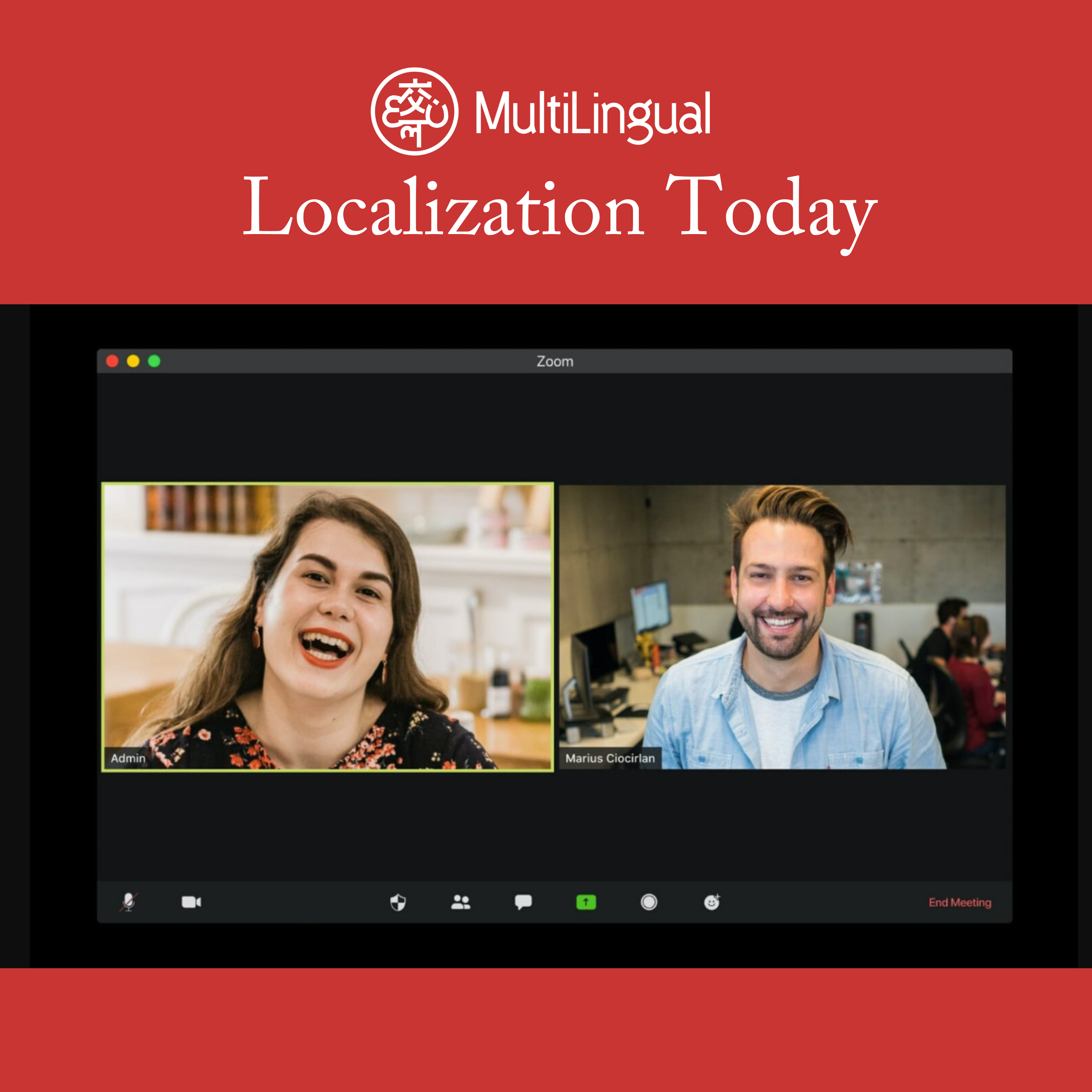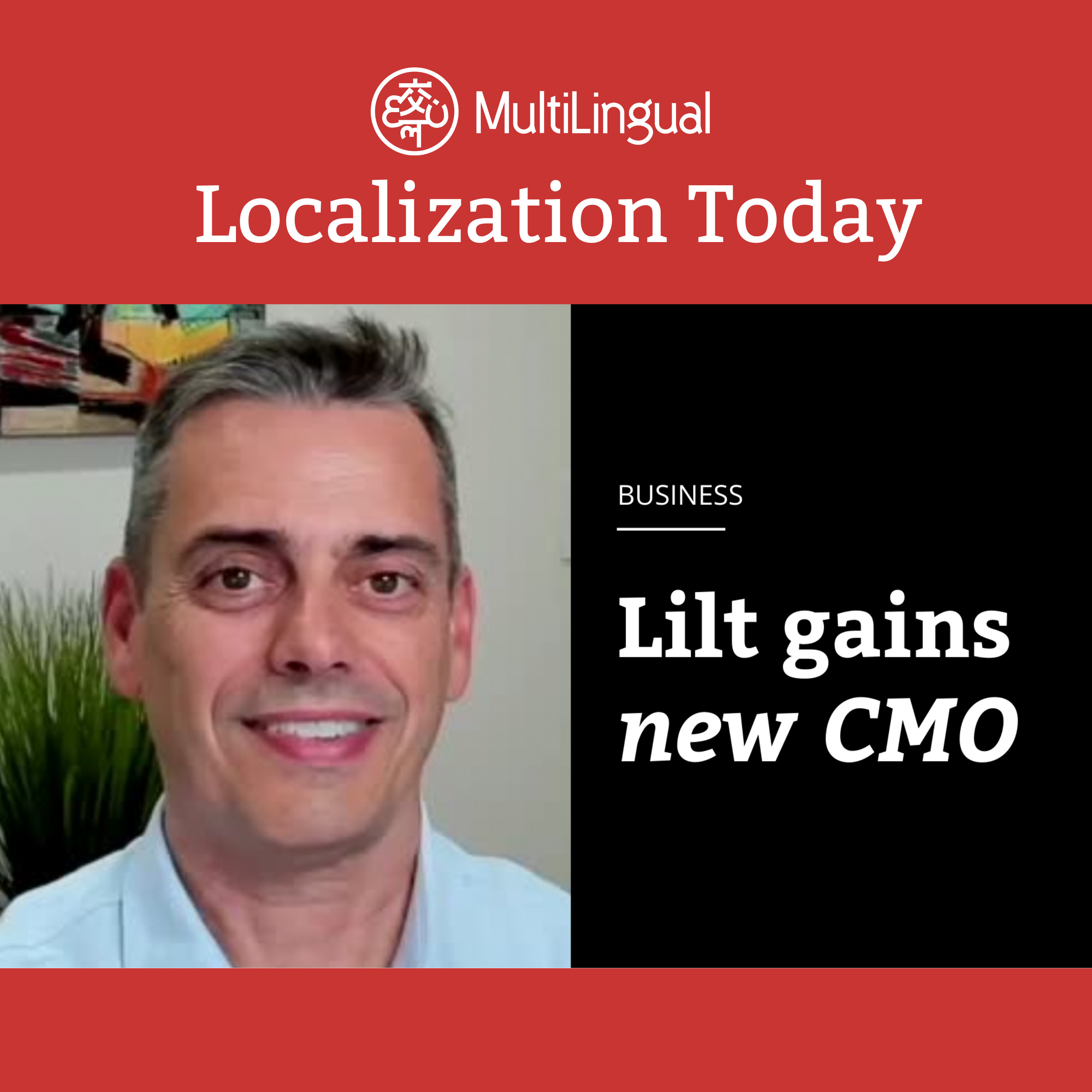Episode Transcript
[00:00:03] Speaker A: Hello and welcome to Localization Today where we explore how language, technology and community converge to unlock ideas for everyone everywhere. I'm Eddie Arrieta, CEO here at Multilingual Media. Today's episode takes us to Middlebury Institute of International Studies, home to one of the most influential programs in translation and localization management.
For decades, MIES has prepared leaders who've shaped our industry across corporations, nonprofits and governments. Yet like many academic institutions, it now faces questions of sustainability and enrollment. To guide us through this conversation, we're joined by Professor Eva Claudinjeva, Associate professor of Professional Practice and Program Chair of Translation and Localization Management at mies. Eva is an accomplished industry leader with over two decades of experience spanning supplier and client side roles in Silicon Valley companies like Apple and VMware, before transitioning into education. She's also a co founder of Women in Localization and a global voice in bringing academia and industry. Eva, welcome and thank you for joining us today.
[00:01:19] Speaker B: Hi Eddie. Hi everyone and thank you for having me.
[00:01:23] Speaker A: Thank you. And I'm off the mic. We were talking about how critical is this conversation for the industry, how critical it is to hear your voice, your story, and also understanding the times that we are in today. We are talking specifically about Mies, because when we think of Ms. In the context of the language industry, diplomacy and globalization, it's a legendary name. I think it's what most would define it as, meaning it's going to transcend the boundaries of time.
So for those unfamiliar with the program, eva, because you will hear about it sooner or later, could you outline some of its most significant milestones and the impact of its alumni?
[00:02:11] Speaker B: Yes. Thank you. So I would like to start with the whole institute. You have already alluded that it's a legendary name, not just when it comes to languages, but also international policy, global security and the whole interconnectedness of the world. It was founded in 1955 specifically to foster international understanding. So it has always had a global mission and a global outreach. And its mission was to prepare leaders for global challenges by providing professional, cross cultural and multilingual education for everyone. Taking any kind of studies, any and following any kind of program in at Ms. It focuses on professional training in not just in programs like translation, interpretation and localization management, which are the ones that our industry knows and recognizes, but also areas like international policy, non proliferation terrorism studies, threat intelligence, sustainable development and many others. Its mission has always been to create a positive long term global impact and empower students to be the solution in a world that's rapidly changing. So that's why the news that our institute is closing has an impact not just on our industry, but on the world as a whole. Our program specifically was founded in 2004. It became officially designated as a STEM program in 2018.
The leadership of my predecessor, the former chair, Max Troyer, and my own contributions as a program chair.
In the last two and a half years, the TLM program has become the leader in localization management education worldwide. We now have 12 faculty working in the program, six full time and six adjunct professors, which are all professional industry experts in this field. So we don't have academic that focus on academic research. We all have professionals and industry experts that are passing on practical knowledge and skills to our students. We now offer three different options to obtain a master's degree. Actually four. Three are residential and one is online.
And we train not just somebody who knows barely anything about localization, so complete newbies, but we also train people who have had some experience with basic localization practices or. Or we upscale localization professionals who are ready to go for the next level. Because of the massive curriculum redesign that we completed last year to follow the latest requirements in the industry, this year, we were able to launch three new specializations that enable our students to not only master all required skills in project management, translation technology, finance, quality and vendor management, which are the traditional localization areas, but also jumpstart their careers in more advanced and more specialized areas.
Not just the traditional language services management, but also program management and creative media localization. And our plan was to launch a specific localization technology management specialization next year, which unfortunately might no longer happen because the school is closing in a year and a half.
And the reason why this is impacting not just the six of us who are going to be losing our jobs, but the whole industry is. We've been the feeder to employers, LSPs and technology companies for years. We, our students are job ready. They're able to immediately start working in localization the first day of the job. They know all of this traditional skills. They know all of the modern skills.
They even have to take a programming class. We have several AI classes.
They're very well rounded in not just technology or the language, but also management and intercultural competencies. So they're ready to start at any level in any company in the world. And that is why suddenly deleting this program and not having it is going to impact not just localization in the United States where most of our students end up, but also localization in other countries where many of our students move in order to work there. So I think it's going to leave a gap that's going to be really hard to overcome. Maybe the impact will not be visible immediately, but three, four, five years down the road, the fact that the program does not exist anymore will definitely be visible and felt because we, our students, our alumni, work in all the big Silicon Valley companies. Google, Apple, Facebook, Adobe, you name it. We have a student, former student there. All the LSPs, all the major ones, even some of the smaller ones. Our students have gone into product management, are doing terminology management, highly specialized linguistic roles. All of that will suddenly disappear in a few years. But we're not giving up hope and we're hoping that with our own efforts, we will find a new home.
[00:07:28] Speaker A: That is great and we'll have an opportunity to talk about those efforts and that hope of finding a new home. Along the conversation, you were referring to the gap that's gonna be felt in the next three to five years, that talent gap, that knowledge gap, as something that's critical. Of course, it seems like that's also what drives how the program has very job placements. There is a lot to do with those abilities that you create. What is the background behind this track record of strong job placement? What factors have made missed graduates so consistently in demand in the industry that you think is going to be missed?
[00:08:09] Speaker B: Of course, one of the reasons which I've already mentioned is the fact that our professors are all industry professionals. We all teach based on our own experience. We're very closely connected with the industry.
We always try to get the pulse of the industry, what the industry needs and how we need to adjust our curriculum and what we're teaching our students. That's why, like our curriculum is the most innovative curriculum in the whole school. We change it every couple of years because the situation in industry changes so fast. We react to the changes very fast as well. We could be faster if we didn't have to go through lengthy academic processes. Unfortunately, that it takes almost a year to change a curriculum, but even then we keep going, we keep innovating. That's one of the strength two of the strengths industry professionals and focus on practical skills rather than academic theoretical research. Second is the fact that we innovate and we always try to stay up to date with what the industry needs and how the the needs are changing. That's why our curriculum, which for the first 15 years of existence was very heavy on language skills and linguistic skills, is now equally heavy, if not more heavy on technology and business skills. And the last is literally in location, we're an hour and a half away from Silicon Valley. We're five to six hours away from Southern California where you have two massive localization hubs. Silicon Valley is mostly IT, but also biotech. Southern California is all entertainment and games. Localization. Majority of our students work in two big hubs. But because we're a STEM designated program, our students, after they graduate, even the international students are allowed to stay in the United States for up to three years to work in American companies. So they also move to other locations. They work in east coast, they work in around Washington D.C.
in Texas. So you can find them all over the United States. But many of them return to their home countries to Europe, to South America, to Asia, and work for the localization companies or buyers over there.
[00:10:25] Speaker A: And it's surprising, of course, and to everyone was surprising to hear the news.
And these are framed in the context of different indicators moving in different directions. Could you give us a word about what's driving enrollment? If there is a drop in enrollment and what potentially could be driving it, politics, cost of tuition restrictions, or any mix of this.
[00:10:51] Speaker B: Actually, all that you mentioned and more, it's a confluence of many different factors. First one is demographics. Lower birth rates in the US mean fewer students. Europe is actually struggling with the same thing right now. Tuition costs and student debts have been rising. So that is putting more financial strain onto anyone who wants to study at an American college or on graduate school. The public, for whatever reason, has lost trust in the value of traditional higher education degrees, meaning Master's level and above. But I have to add that Ms. And is an exception because all of our degrees, not just tlm, are extremely practical rather than theoretical. And like I've said, our students are immediately job ready, starting their first day on the job. But students who are looking at math as a school might not realize that we're, we're so, so practical and that they will be able to even start working while they're still, still studying at the school. We have a lot of students who are doing internships while they're still studying for their master's degree. The pandemic further disrupted enrollments and many students are less inclined to move from their states with lower cost of living to a very expensive location in California for domestic students. The access to financial aid from the US Government has become much harder due to the fact how it's being administered for international students. On the other hand, the path to obtain visa has become harder in the recent years and there is overall uncertainty on both geopolitical and Economical levels that are also contributing negatively. So it's not any one thing. It's unfortunately a perfect storm when all of these factors have been hitting us all at once in the past three years.
[00:12:45] Speaker A: And Eva, of course, you've mentioned the devastating effect that this could have in their talent pool that it will have in the talent pool unless something is done in the next three to five years.
This reality and what it means not only to staff, but also to a lot of people in the industry have generated, let's say, a spontaneous move to try to save the program. And you alluded a little bit to it, kind of like as the hope that that's there, possibly relocating it or reimagining it in another context.
How do you see these possibilities?
[00:13:24] Speaker B: Yes, we're currently working on two different levels. There's an effort going on, led by the professors, to save the whole institute as is. But the individual departments are also working on finding new homes in case that joint effort fails. We in the TLM department are actively looking for a new institution who is interested in bringing us over in order to enhance their existing technology, business or language offerings. Because we offer a master's degree that's at an intersection of all of these areas. We're a mature department, we're a profitable department, and we have the most comprehensive localization management curriculum in the world. So adding us to their current offering would be a great plus to any university who is interested in talking to us. We have actually created a business case to show our value and our impact on the new home institution, and we are ready to share it with anyone who is interested in talking to us. We cannot afford to wait three to five years until the gap is visible. However, it takes two years to educate our students to the level that we've been educating them until now. So we already need to start looking for the home right now so that within the next year or two, we already have a new home institution who can start the enrollment in order to admit students two to three years down the road.
[00:14:51] Speaker A: Goodness, so many ideas, Park. I wonder what institutions might be considering this. Definitely there is a great opportunity there. And you know, you've heard a lot of voices. We've definitely seen a lot of voices in the industry talking about the effect that Mises had on them, what it has meant for them. I myself did a summer program at some point with the Davis foundation on Global Trade and Development, and remember the huge difference I found in the experience in the campus and the city and then kind of like leaving that side of the United States was a very transformative experience for me and I was in college somewhere else in the United States, but that was very interesting. And then seeing the stuff and the way things were taught and the way we were spoken about, that was very incredible as an experience for me. Of course we at Multilingual want to be part of this and other people don't want to miss the opportunity to show their support and to actually execute on that on that support that they want to have or to give. Rather, why can people in our industry and beyond do to help support the program right now and ensure it continues to serve future generations of Localization professionals?
[00:16:14] Speaker B: For anyone who is out there who sees a synergy between your institution and what we do in our program or MIES as a whole, please contact me or any one of my colleagues to start exploratory conversations. If you don't represent an institution who could take us over. But if you would like to voice your support to our Localization Management as well as Translation and Interpretation departments, you can add a short statement of support to the survey we ran last week. You can either find me under my name or under Women in Localization or Ana Schlegel or I hope the link can also be added to this interview post. So we are collecting these statements of support and we're making them part of the business case in order to show our new potential institution the value we're having on the industry and support we're getting from the industry. But if I may, I would also like to sincerely thank all of those people who have already shown their public Support, either through LinkedIn messages or through the survey, to those who have already come up with actionable suggestions to help us or connected us with potential contacts. I want to express huge thanks to Women and Localization who has immediately spearheaded an effort to support us as well as you and the multilingual magazine for the opportunity to tell our story and speak on our behalf. So thank you very much. We really appreciate your support in this rank.
[00:17:44] Speaker A: Thank you Eva and I want to thank our listeners for listening to Localization Today. A heartfelt thank you to you, Professor Eva Claudiniova, for sharing your perspective on legacy challenges and the future of MIES on the Translation and Localization Management program and for reminding us of the vital priority bridge between academia and community. Please catch new episodes of Localization Today on Spotify, Apple Podcasts and YouTube. Subscribe, rate and share so others can find the show. I'm Eddie Arrieta with Multilingual Media. Thanks for joining us and we'll see you next time.


